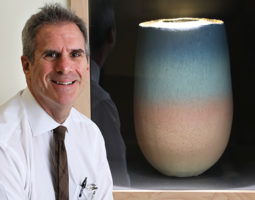Accelerate Care
If you’d like to support mind-body wellness programs for medical students, please make a gift to the Friends of the UW School of Medicine.
Give Now >Serving MD, MD/PhD, Res., Fel., PhD, PA-C (MEDEX), MA, MS, BS, PT, OT and P&O alumni, your UW School of Medicine Alumni Association is the place to connect with your classmates, your School and the next generation of medical professionals.

850 Republican Street, C-5
Seattle, WA 98195-8045
 There’s a weight that comes with treating very sick patients. For pulmonologist Joshua Benditt, MD ’82, releasing that weight is essential to well-being. At the end of a difficult day, he’ll often decompress in his home studio, throwing clay on a pottery wheel.
There’s a weight that comes with treating very sick patients. For pulmonologist Joshua Benditt, MD ’82, releasing that weight is essential to well-being. At the end of a difficult day, he’ll often decompress in his home studio, throwing clay on a pottery wheel.
“It’s a really meditative practice,” he says. “When I need time to process difficult patient situations — where someone’s died or at risk of dying — the spinning wheel and repetitive motion are very calming and helpful.”
Benditt discovered ceramics in high school and even considered becoming a professional potter. His art teacher, however, suggested that he pursue medicine as a career and pottery in his free time. “That was wise advice, because it can be hard to make a living as a potter unless you are at the very highest level,” says Benditt. “But I’ve been making pottery ever since.”
Once Benditt had settled on a career in medicine, the question of where to go to medical school was easy. “UW Medicine is in my blood,” he says. His father, Earl Benditt, MD, was the chair of the Department of Pathology for several decades; Benditt fondly remembers a childhood spent running around the halls of the UW School of Medicine. “It always seemed like an amazing place, and I really wanted to come here,” he says.
Today, Benditt is a professor of pulmonary, critical care and sleep medicine at the UW School of Medicine. As UW Medical Center’s medical director of respiratory services, Benditt oversees the hospital’s 70-plus respiratory therapists. He treats patients with neuromuscular respiratory failure, which includes conditions like multiple sclerosis and amyotrophic lateral sclerosis (ALS).
“In my clinic, I have long-term patients that I’ve known for 20 years, which is an incredible positive,” says Benditt. When patients have terminal diseases, Benditt often counsels them on end-of-life choices — and when he does, he thinks of Stu Farber.
For many years, Benditt worked closely with Stuart Farber, MD, who founded UW Medical Center’s Palliative Care Program. “Stu was amazing,” says Benditt. “He knew how to talk to people without creating fear in the patient, even during difficult discussions. When he developed leukemia and was in that position himself, he also served as an example for people. We still miss him.”
After Farber’s passing, Benditt decided to create a piece in his honor and donated it to UW Medical Center’s art collection. “Stu grew up in Tacoma; he was an avid water-skier who always talked about getting up early to go waterskiing,” says Benditt. “I made a piece that looks like a sunrise, and it’s on display near the office for the Palliative Care Service.”
That’s not the only way Benditt has used his artistic talents for good. Every year or two, he holds an art sale featuring dozens of his ceramic creations. Proceeds benefit a fund that supports equipment for patients with breathing failure, educational programs and research. The next sale is tentatively scheduled for spring 2020.
Having found balance through art, Benditt firmly believes that healthcare providers should find a passion outside of work. “I always tell medical students and residents they should find an activity that they enjoy close to home,” says Benditt. “Having an interest outside medicine, and making a conscious effort in maintaining it, has helped me a lot.”
Soon, clay may be Benditt’s full-time focus. After retirement, he plans to spend much of his time in the studio creating art. “For a while, I thought pottery might be my life’s work,” he recalls. In a way, perhaps it has.